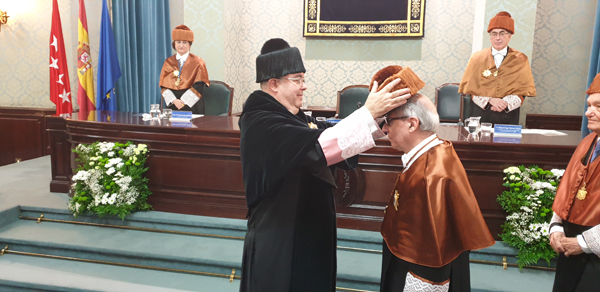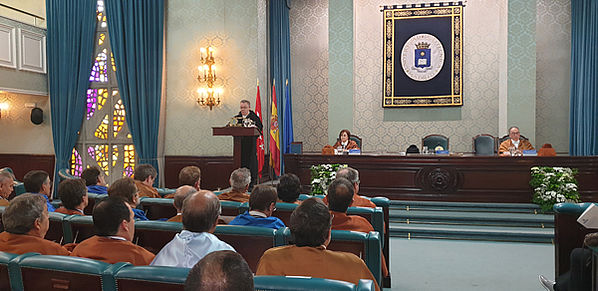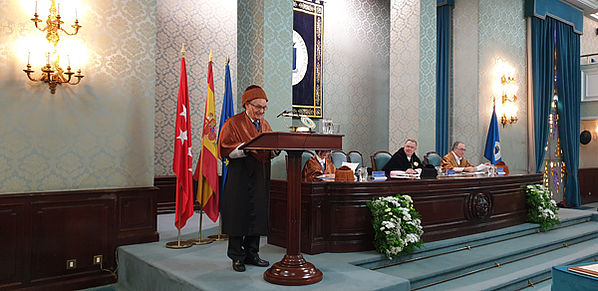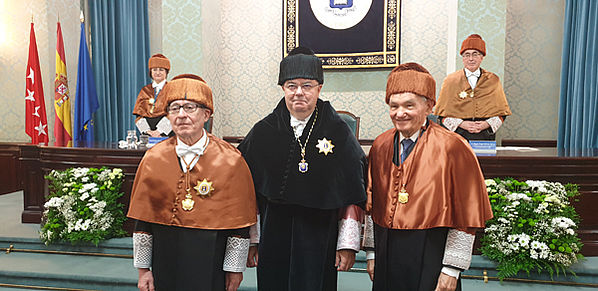Enrique Sánchez-Palencia, the emeritus Research Director of the Institute Jean Le Rond d´Alember from the University Pierre et Marie Curie and member of the French Academy of Science, was given an honorary doctorate from Universidad Politécnica de Madrid (UPM), in a ceremony chaired by its rector, Guillermo Cisneros.

Based on the fundamental principles of the Elasticity and Fluid Mechanics, Professor Sánchez Palencia has been a pioneer in the development of asymptotic and homogenisation techniques that allow the analysis of the behaviour and reliable use of structural materials. These materials are hugely relevant in Aeronautical Engineering, where composite materials with carbon fibres embedded in plastic material have become the primary structural material.
Furthermore, his first studies on basic problems in Magneto-Hydrodynamics have been applied within fields such as plasma confinement, nuclear reactors and space propulsion.
Guillermo Cisneros, the Rector of the UPM explained that Professor Sánchez-Palencia's curriculum vitae and track record “are an example of some Spanish engineers, unknown to the general public and Spanish journalists, who have contributed to the development of both knowledge and the role of the rigour of the education in our Engineering Schools.”
In this respect, Enrique Sánchez-Palencia, new doctor honoris causa, remembered several professors who "impressed him" on the former ETSI Aeronáuticos of the UPM as well as the Faculty of Sciences of the University Pierre et Marie Curie of Paris, where he completed a postgraduate course; among them, professors Amable Liñán, Francisco Morán, Ignacio Da Riva and Henri Cabannes. “Markedly different from each other, they were capable, each in his own way, to draw attention to the essential, thus transmitting the satisfaction from understanding rather than knowing.
Engineering schools, key to the social transformation in 21st century
Moreover, the Rector of the UPM highlighted in his speech the training received by professionals in our country, “highly qualified from a technical point of view”, and that they contribute “in a decisive way to the technological progress of our already globalised world.”
At a time when STEAM vocations are dwindling, "we have to undertake greater efforts to make our young people realise that engineering schools have been the lever that has allowed the social changes in the 21st century," he said.

Likewise, Guillermo Cisneros claimed a “greater social recognition for our graduates to compensate them for the –greater- effort they make in our Schools and Faculty”, since “when it seems that rigour and effort are poorly valued by the society, we must highlight that only through them it is possible to achieve relevant advances in knowledge,” he concluded.
In this regard, the new doctor also referred to scientific rigour, which, in his opinion, “consists of extracting the essential and disregarding the superfluous. This rigour should neither be confused with dogmatism, nor with some kind of perfection that is always fictitious and unattainable. In my opinion, science is comprehending of causality, understanding, coherence, compatibility and, as far as possible, predictive effectiveness.”
Sánchez-Palencia, inspiration for generations of researchers
Amable Liñán, awarded with Prince of Asturias Award, Professor Emeritus of the School of Aeronautical and Space Engineering (Escuela Técnica Superior de Ingeniería Aeronáutica y del Espacio) of UPM and the new doctor's mentor has praised his leading figure. Enrique Sánchez-Palencia was a student of the first class Professor Liñán taught during 1960/1961 academic year. He happen to meet other highly-talented students, such as Juan de Burgos, Antonio Crespo, José Chirivella and José Antonio González, students who "significantly influenced” Liñán, both in their teaching and research education.

Particularly influential was Sánchez-Palencia because of the “rigour requirement he expected during classes, a distinctive feature of someone outstandingly gifted for Mathematics,” highlighted Liñán. “I also understood that rigour, along with precision, enhanced the quality as well as the effectiveness of engineering education," he stressed.
Professor Sánchez-Palencia has also had a "substantial direct influence in generations of ETSI Aeronauticos’ researchers, who have been inspired by his scientific honesty, as well as the rigour and quality of his contributions," Amable Liñán concluded in his laudatio.

About Enrique Sánchez-Palencia
After obtaining his degree of aeronautical engineer at the ETSI Aeronauticos of the Universidad Politécnica de Madrid, he continued his post-graduate studies in France. He is currently the emeritus Research Director of the Institute Jean Le Institute Rond d'Alembert from the University Pierre et Marie Curie and member of the French Academy of Science.
The scientific work of Professor Sánchez-Palencia has given rise to 199 articles and five books.
Throughout his career, he has received the Bronze medal in Mechanics from CNRS (Centre national de la recherche scientifique), the Henri de Parville Prize in Mechanics, awarded by the French Academy of Science; the CNRS Silver Medal in Physical Sciences in Engineering, or the Prize of the French Institute of Petroleum, awarded by the French Academy of Science, among other awards and distinctions.
From his first works on existence and uniqueness in problems of Magneto-Hydrodynamics, Professor Sánchez-Palencia focused on the use of asymptotic methods for boundary problems within Mechanics. More recently, he has been dealing with issues of Scientific and Epistemology Culture and Methodology, with contributions covering several fields, from biodiversity to biological evolution, and has received unanimous praise from mathematicians, physicists and historians.

